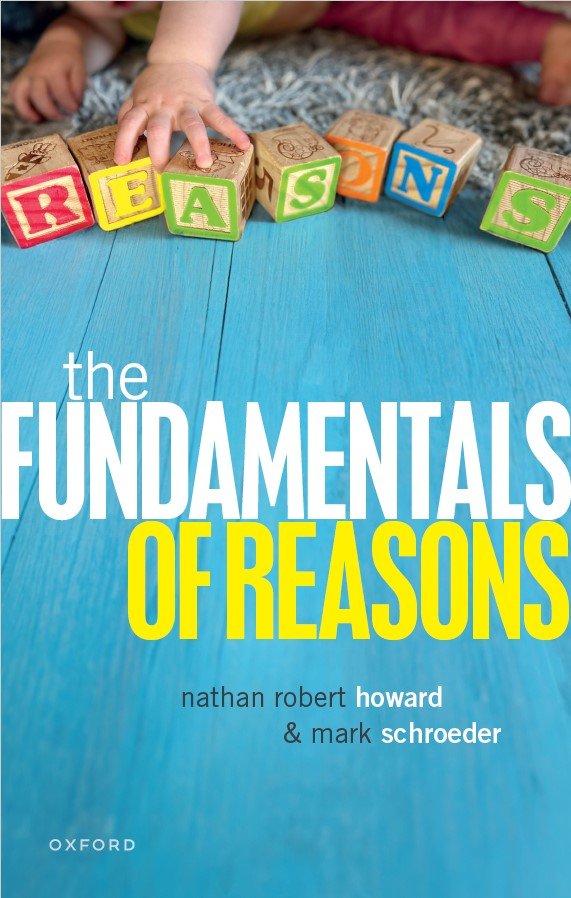Reasons and Explanation in Moral Theory
The first major strand of my research comes out of my work in graduate school, and concerns the nature of reasons and explanation in ethical theory. The core of this research is my first book, Slaves of the Passions (Oxford 2007), and representative highlights appear in my first volume of collected papers, Explaining the Reasons We Share (Oxford 2014).
The main themes in this work concern whether and how morality can be explained, and when it is that moral differences are best explained by underlying moral similarities. I also classify as parts of this strand of my work contributions to the history of moral philosophy, especially work on the Cambridge Platonist Ralph Cudworth and on Kant’s account of hypothetical imperatives, and work concerning the fundamental nature of what is at stake between consequentialist and non-consequentialist moral theories.
In Slaves of the Passions, which grew immediately out of my doctoral dissertation, I defended a kind of Humean or desire-based theory of the nature of normative reasons by showing how most of the best objections to Humean theories are really objections to stronger interpretations of Humean commitments. The book also constitutes a kind of robust defense of a form of reductive naturalism in metaethics.
My most recent contribution to this strand of my work is ‘A Common Subject for Ethics.,’ forthcoming in Mind.
Moral Metaphysics
-
‘Realism and Reduction: The Quest for Robustness.’ Philosophers’ Imprint 5(1): www.philosophersimprint.org/005001/, February 2005.
This paper explores the question of what makes some reductive theories eliminativist rather than vindicatory, and applies my answer to the prospects for metaethical reductionism.
-
‘Huemer’s Clarkeanism.’ Philosophy and Phenomenological Research 78(1): 201-208, January 2009.
This is a contribution to a symposium on Michael Huemer’s Book Ethical Intuitionism.
-
‘Supervenience Arguments Under Relaxed Assumptions.’ With Johannes Schmitt. Philosophical Studies 155(1): 133-160, August 2011. Reprinted in Explaining the Reasons We Share.
A number of important arguments in metaethics rely on the concept of supervenience. These arguments typically take for granted the S5 modal logic. But what do these arguments look like if we relax this assumption? And what is the right way to formulate supervenience in weaker modal logics, such as that advocated by Ralph Wedgwood in The Nature of Normativity? We do the work to sort this out so that you don’t have to.
-
‘The Price of Supervenience.’ Published in Explaining the Reasons We Share. Oxford: Oxford University Press, 124-144, May 2014.
This paper explores the prospects for answering supervenience-based arguments against nonreductive realism in metaethics by following Richard Price in taking the irreducible moral facts to always be necessary.
The Metaphysics of Reasons
-
‘Weighting for a Plausible Humean Theory of Reasons.’ Noûs 41(1): 138-160, March 2007.
In this predecessor to chapter six of Slaves of the Passions I argue that with a more sophisticated view about the weight of reasons, Humeans can answer the Too Few Reasons objection.
-
‘Reasons and Agent-Neutrality.’ Philosophical Studies 135(2): 279-306, August 2007. Reprinted in Explaining the Reasons We Share.
This paper explores different hypotheses about the relationship between reason ascriptions that are relativized to agents and those that are not, and explains why our answers to these questions are consequential for metaethics and moral theory.
-
‘The Humean Theory of Reasons.’ Oxford Studies in Metaethics 2: 195-219, April 2007. Reprinted in Explaining the Reasons We Share.
This paper introduces a methdological argument for the Humean Theory of Reasons that forms the backbone of the argument in Slaves of the Passions. The structure of the argument is developed more carefully in this paper than in the book.
-
‘Précis of Slaves of the Passions.’ Philosophical Studies 157(3): 432-434, February 2012.
This article briefly introduces the main ideas of Slaves of the Passions for a symposium published in Philosophical Studies based on an Author-Meets-Critics session at the Pacific APA.
-
‘Reply to Shafer-Landau, McPherson, and Dancy.’ Philosophical Studies. 157(3): 463-474, February 2012.
This paper contains my replies to the symposiasts in the Philosophical Studies symposium on Slaves of the Passions.
Particularism
-
‘A Matter of Principle.’ Joint critical notice of Jonathan Dancy, Ethics Without Principles, and Sean McKeever and Michael Ridge, Principled Ethics. Noûs 43(3): 568-580, September 2009.
This paper is a joint critical notice of two important recently published books about ethical particularism - one defending it and one defending generalism.
-
‘Holism, Weight, and Undercutting.’ Noûs 454(2): 328-344, June 2011.
This paper uses considerations about undercutting defeat and the weight of reasons in order to try to provide an alernative, more explanatory, account of the kinds of phenomena that motivate ethical particularism.
The History of Ethics
-
‘The Hypothetical Imperative?’ Australasian Journal of Philosophy 83(3): 357-372, September 2005. Reprinted in Explaining the Reasons We Share.
In this paper I consider whether Kant was committed to there being a single master capital-H Hypothetical Imperative that is itself an imperative that applies to the conduct of every rational agent independent of their ends. I argue that this cannot be a plausible interpretation of Kant and address both philosophical and textual arguments otherwise.
-
‘Cudworth and Normative Explanations.’ Journal of Ethics and Social Philosophy, www.jesp.org, (2005), vol. 1, no. 3, October 2005. Reprinted in Explaining the Reasons We Share.
In this paper I show how a recurrently tempting line of argument depends for its plausibility on a picture about how moral explanations work that was first articulated by Ralph Cudworth. But I also show that Cudworth was himself more sophisticated about the force of this line of argument than some of its contemporary proponents.
General Metaethics
-
‘Attributing Error Without Taking a Stand.’ With Caleb Perl. Philosophical Studies 176: 1453-1471, February 2019.
In this paper we develop a non-standard way of interpreting metaethical error theory in presuppositional terms and show how it provides room to make sense of Mackie’s distinction between first-order and second-order claims, and to answer Dworkin’s arguments about the inseparability of metaethical skepticism from first-order commitments.
-
‘Willing Belief.’ International Journal for the Study of Skepticism 8(4): 300-321, December 2018.
This paper is a contibution to a symposium on Bart Streumer’s provocative and unbelievable book Unbelievable Errors.
-
‘A Common Subject for Ethics.’ Mind 130(1): 85-110, January 2021.
This paper introduces and explains what I call the common subject problem for ethics, and explains how it simultaneously motivates various forms of moral irrealism and also various attempts to articulate what is central to ethics’ common subject.
-
‘On What Matters.’ Review of Derek Parfit, On What Matters, volumes 1 and 2. Notre Dame Philosophical Reviews, http://ndpr.nd.edu, August 2011.
This is a long review essay about Derek Parfit’s seminal On What Matters. I offer a take on what ties both volumes of the book together and connects them both to his goals in Reasons and Persons, and a diagnosis of why Reasons and Persons was so much more successful.
-
'What Matters About Metaethics?' In Parfit's Defense of Objectivity in Ethics and Practical Reasoning, a volume of new essays on Derek Parfit's On What Matters, edited by Peter Singer (Oxford University Press). Reprinted in Explaining the Reasons We Share.
This paper offers my reply to Derek Parfit’s answer to Slaves of the Passions in volume 2 of On What Matters.
-
‘Defining Moral Realism.’ With Jennifer Foster. In the Oxford Handbook to Moral Realism, edited by Paul Bloomfield and David Copp, 3-17 September 2023.
We consider the question of whether moral realism can be adequately defined in a principled way, once and for all, that we can expect to withstand new developments in metaethics, and argue that the answer is no.
-
‘Normative Ethics and Metaethics.’ In the Routledge Handbook to Metaethics, edited by Tristram McPherson and David Plunkett, 674-686, September 2017.
This handbook entry discusses the relationship between normative ethics and metaethics, including which kinds of metaethical view make metaethics independent of normative ethics and which do not.
Instrumental Rationality
-
‘The Scope of Instrumental Reason.’ Philosophical Perspectives 18 (Ethics): 337-364, November 2004.
In this paper I explore a number of analogous topics where theorists have defended “wide scope” treatments and consider a common class of problems for such accounts.
-
'Instrumental Mythology.’ Journal of Ethics and Social Philosophy, www.jesp.org, (2005), symposium 1, December 2005.
This paper is a contribution to a symposium on Joseph Raz’s paper ‘The Myth of Instrumental Reason.’
-
‘Means-End Coherence, Stringency, and Subjective Reasons.’ Philosophical Studies 143(2): 223-248, March 2009. Reprinted in Explaining the Reasons We Share.
This paper explores the correct way to explain the norm of instrumental rationality.
-
‘Scope for Rational Autonomy.’ Philosophical Issues 23: 297-310, August 2013. Reprinted in Explaining the Reasons We Share.
This paper explores the relationship between rationality and autonomy, and argues for a conception of the rules of rationality on which they are self-legislated, but the appearance of a common set of rational rules comes from the structural facts about how we legislate rational rules for ourselves by taking on commitments in thought.
-
‘Hypothetical Imperatives: Scope and Jurisdiction.’ In Reason, Value, and Respect, edited by Robert Johnson and Mark Timmons. Oxford: Oxford University Press, 89-100, March 2015. Reprinted in Explaining the Reasons We Share.
This paper is a contribution to a festschrift for Thomas Hill, Jr. I return to our disagreement over whether Kant subscribes to a single principle of practical reason, the Hypothetical Imperative, and argue that the answer is very important for the relationship between practical reason and autonomy. This paper is a close companion to ‘Scope for Rational Autonomy’, above
Value Theory
-
‘Not So Promising After All: Evaluator-Relative Teleology and Common-Sense Morality.’ Pacific Philosophical Quarterly 87(3): 348-356, September 2006.
In this paper I respond to Douglas Portmore’s argument that evaluator-relative teleology can preserve what is intuitively compelling about consequentialism while still accommodating deontological constraints.
-
‘Teleology, Agent-Relative Value, and ‘Good’.’ Ethics 117(2): 265-295, January 2007.
In this paper I argue against various attempts to use agent-relative accounts of ‘good’ in order to partner intuitive advantages of deontology with supposed theoretical benefits of consequentialism.
-
‘Buck-Passers’ Negative Thesis.’ Philosophical Explorations 12(3): 341-347, July 2009.
I show that it is a fallacy to infer from the fact that some fact consists in the fact that there are reasons to do something, that it cannot itself be a reason to do it.
The Wrong Kind of Reasons
-
‘Value and the Right Kind of Reasons.’ Oxford Studies in Metaethics 5: 25-55, August 2010.
In this paper I offer arguments in favor of analyzing value in terms of reasons, and offer an account of the right/wrong distinction that can be used to validate this account. The account of the right/wrong distinction in this paper is intended to be an attempted improvement over that in chapter seven of Slaves of the Passions.
-
‘The Ubiquity of State-Given Reasons.’ Ethics 122(3): 457-488, April 2012.
In this paper I argue against the view that state-given reasons cannot be the right kind of reason, focusing on examples involving reasons against belief and against intention.
-
‘State-Given Reasons: Prevalent, if not Ubiquitous.’ Ethics 124(1): 128-140, October 2013.
In this paper I reply to the symposiasts in a symposium published in Ethics on ‘The Ubiuity of State-Given Reasons.’ I take back my treatment of some of the examples in that paper but argue that the core of my argument can be maintained.
The Explanatory Centrality of Reasons
-
‘What Makes Reasons Sufficient?’ American Philosophical Quarterly 52(2): 159-170, April 2015.
This paper explores the question of what makes reasons sufficient and argues that it is just a matter of beating competitors. It is predecessor of the arguments in Part 3 of Reasons First.
-
‘The Fundamental Reason for Reasons Fundamentalism.’ Philosophical Studies 178: 3107-3127, October 2020. Finalist, Marc Sanders Prize in Metaethics, 2019.
This paper introduces what I call the Fundamental Argument for Reasons Fundamentalism. The version of the argument stated here is slightly different from the version that I give in Part 4 of Reasons First. Chapter 12 of The Fundamentals of Reasons discusses both versions.
-
‘Commitment: Worth the Weight.’ With Alida Liberman. In Weighing Reasons, edited by Errol Lord and Barry Maguire, Oxford University Press, 104-120, January 2016.
We consider the ways in which the weights of commitments are like and unlike the weights of reasons.
-
'The Unity of Reasons.' In Daniel Star, ed., The Oxford Handbook to Reasons and Normativity, 46-66, July 2018.
This paper explores issues that come up when combining theoretical and practical reasoning in the same framework.







